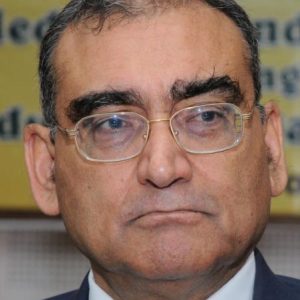
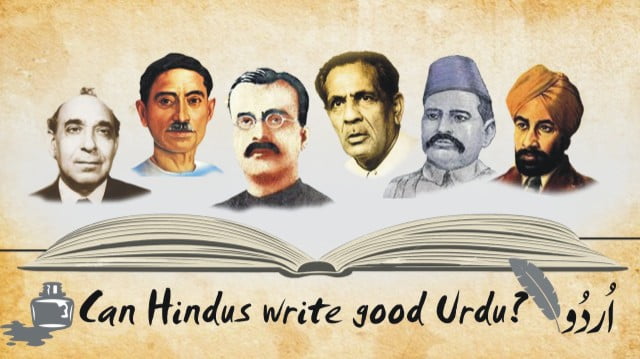
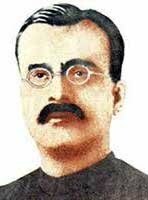
Can Hindus write good Urdu? This became a controversy in the Chakbast affair in the early 20th century.
Brij Narain Chakbast (1882-1926) was a Kashmiri Pandit living in Lucknow. He was a successful lawyer, and also an Urdu poet, whose poetry is even today part of the curriculum in Urdu Departments in Indian Universities and Colleges upto the post graduate level.
His Urdu Ramayan is a classic.
A controversy arose in Lucknow, which was one of the centres where Urdu flourished, over Chakbast’s edition in 1905 of the masnavi (a form of Urdu poetry) called ‘Gul Bakawali‘ also known as ‘Gulzar-e-Naseem‘) written in 1844 by Daya Shankar Kaul ‘Naseem’ (1811-45), a well known Urdu poet of Lucknow.
Chakbast said that Daya Shankar Naseem’s poetry was superior to the poetry of other contemporary Urdu poets of Lucknow.

This infuriated Maulana Abdul Haleem Sharar, a contemporary of Chakbast, who published the Urdu journal ‘Dilgudaz‘. Sharar wrote that Gulzar-e-Naseem was not written by Naseem at all, but by a Muslim poet Aatish Lakhnavi. Sharar also wrote that Hindus cannot write good Urdu poetry.
This became a full blown feud, and strong views were expressed by many people on the topic. Ultimately, Sajjad Hussain Lakhnavi, the publisher of the Urdu magazine ‘Oudh Punch‘ came to Chakbast’s rescue.
Sajjad said that in judging the worth of a poem one must only see the merit of the poem itself, and it was wholly improper and irrelevant to consider whether it was written by a Hindu or Muslim. He also examined ‘Gulzar-e-Naseem’ carefully, and came to the conclusion that it was indeed written by Naseem, and was of the highest order.
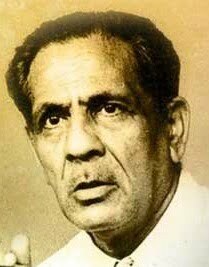
Sajjad Hussain Lakhnavi’s defence of Chakbast put a quietus forever on the question whether Hindus could write good Urdu. Indeed many Hindu poets like Firaq Gorakhpuri (whose real name was Raghupati Sahai), A.N.Mulla,etc rose to the highest ranks in Urdu poetry.
In Urdu prose too the contribution of non Muslims ( Hindus and Sikhs ) is of the highest order, e.g. Ratan Nath Dhar Sarshar, Munshi Premchand ( who originally wrote in Urdu, and only later switched to Hindi ), Krishan Chander, Rajinder Singh Bedi, Gulzar etc
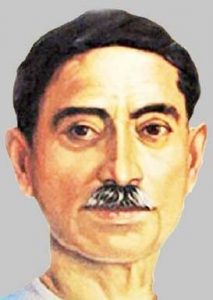
Urdu was the common language of the educated class in North India, and even in parts of south India (e.g. Hyderabad), of all, whether Hindu, Muslim, or Sikh, upto 1947. It was the British policy of divide and rule which did great damage to Urdu.
The British rulers propagated through their local agents that Hindi is the language of Hindus, while Urdu was the language of Muslims.
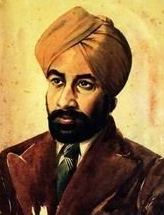
This false propaganda was done so effectively and systematically, year after year and decade after decade, that most Hindus gave up Urdu, and later even most Muslims gave it up.
However, the language which speaks the voice of the heart can never be destroyed as long as people have hearts.
The fact that Urdu is very much alive today, despite all efforts of some bigots to crush it, is seen by the surprisingly large crowds mushairas attract, from all sections of Indian society, Hindus, Muslims, Sikhs, etc. People even now read the works of Mir, Ghalib, Faiz, Firaq, etc (though nowadays usually in Devnagagari/Roman script).
Urdu will forever live in the hearts of Indians. ![]()
Also Read:
Indian Education System Needs Remodelling
Can the Draconian Money Grab Bill (FRDI) Revisit Again in its new Avatar (FSDR)?
Caste Based Census Should Become a Reality
Pandemic Profits and Politics – the saga of India’s “La Casa De Papel”
Watch video:

Disclaimer : PunjabTodayTV.com and other platforms of the Punjab Today group strive to include views and opinions from across the entire spectrum, but by no means do we agree with everything we publish. Our efforts and editorial choices consistently underscore our authors’ right to the freedom of speech. However, it should be clear to all readers that individual authors are responsible for the information, ideas or opinions in their articles, and very often, these do not reflect the views of PunjabTodayTV.com or other platforms of the group. Punjab Today does not assume any responsibility or liability for the views of authors whose work appears here.
Punjab Today believes in serious, engaging, narrative journalism at a time when mainstream media houses seem to have given up on long-form writing and news television has blurred or altogether erased the lines between news and slapstick entertainment. We at Punjab Today believe that readers such as yourself appreciate cerebral journalism, and would like you to hold us against the best international industry standards. Brickbats are welcome even more than bouquets, though an occasional pat on the back is always encouraging. Good journalism can be a lifeline in these uncertain times worldwide. You can support us in myriad ways. To begin with, by spreading word about us and forwarding this reportage. Stay engaged.
— Team PT


Copyright © Punjab Today TV : All right Reserve 2016 - 2024 |